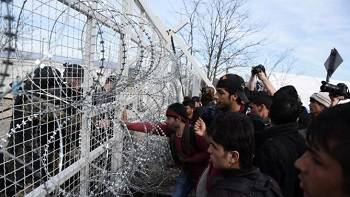Greece has said it is taking action to persuade Macedonia to take in Afghan refugees as thousands remain stranded at the border and the main port in Athens.
"We have begun diplomatic moves ... we believe the problem will be resolved," Yiannis Mouzalas, the junior interior minister for migration, told parliamentary television on Monday.
He said in another interview that Athens was seeking to exert pressure at the "European and bilateral level", without specifying what steps it was planning.
About 5,000 refugees are stuck at the border with Macedonia after the neighboring non-EU state on Sunday refused to allow passage to Afghans, police said.
Over 400 Afghans staged a sit-down protest in no-man's land, holding makeshift signs that read "We can't go back" and "Why racism?"
Dozens of Afghan children held other signs reading "Help us cross border".
'Die here or go on'
"We cannot go back. We will either die here or go on," said 20-year-old Mohamed Asif.
"We have paid so much money to get this far. Germany said it would accept refugees. What has changed now?"
Another 3,000 people were blocked in Athens after landing at the port of Piraeus from the Aegean islands, a government source said, adding that officials were scrambling to find room for them.
"We do not expect a [diplomatic] solution today," the source told AFP, adding: "We will accommodate the Afghans while trying to prevent overcrowding at any of the facilities available.
"Officials said they would open a newly completed relocation camp near Piraeus to handle the emergency.
The arrival last year of more than one million refugees and migrants in Europe, many fleeing war, poverty and persecution, has caused a chain reaction of border clampdowns among several EU states.
As the main gateway into the EU, Greece has been struggling to cope with the new arrivals and fears new restrictions by other members will leave tens of thousands of people stranded on its territory.
Despite strong objections from the EU, Austria on Friday introduced a daily limit on asylum seekers entering and registering in the country, triggering fears of a domino effect along the Balkan route.
It was the latest example of unilateral action taken by an EU country to stem the migrant flow, as the bloc struggles to cope with the continent's worst migration crisis since World War II.
Hungary on Monday reported a sharp rise in the numbers of refugees and migrants breaching its southern borders in February, the first significant surge since the frontiers were sealed last year.
Around 1,500 migrants tried to enter the EU member state illegally from Serbia this month, with 500 alone caught between Friday and Sunday, police said in a statement.
Serbia, Slovenia, Austria, Croatia and Macedonia signed on Thursday a joint statement announcing new tightened restrictions on refugees and migrants passing through those countries.
Though the statement did not address whether Afghan refugees would be allowed to continue, it did note that "longer residence in a safe third country" could be grounds for rejecting asylum seekers, citing as an example "Afghan national[s] who for a longer time stayed in Turkey or Iran".
Serbian borders
Dejana Nedeljkovic, Macedonian interior ministry spokesperson, said: "Since February 19, Serbia has only accepted those coming from Syria and Iraq."
On Friday, 367 Afghan refugees were blocked from entering Serbia from Macedonia, Nedeljkovic told Al Jazeera, adding that, by contrast, Macedonian authorities have "not differentiated between Syrians, Iraqis and Afghans".
Nedeljkovic said that, for Macedonia's part, "there are 617 people from Afghanistan in Macedonia who are not allowed to enter Serbia", who are now "at a refugee transit centre" in Macedonia's Tabanovce.
"We still don't have an official statement from the Serbian government about why this is the case," she said, adding that it was unclear if the entry denials indicated a change in Serbian policy.
According to UN refugee agency UNHCR, more than a million refugees and migrants reached European shores by boat last year.
Since the beginning of 2016, more than 101,000 have made the trek across the Mediterranean Sea to Europe. Of this total, at least 27 percent are from Afghanistan, according to UNHCR.
PHOTO CAPTION
Afghan refugees push a fence at the Greek-Macedonia borderline as they try to enter Macedonia near the northern Greek village of Idomeni, Monday, Feb. 22, 2016.
Al-Jazeera


 Home
Home Discover Islam
Discover Islam Quran Recitations
Quran Recitations Lectures
Lectures
 Fatwa
Fatwa Articles
Articles Fiqh
Fiqh E-Books
E-Books Boys & Girls
Boys & Girls  Ramadan
Ramadan Fatwa Audios
Fatwa Audios Month of Mercy
Month of Mercy Women
Women Eed Al- Fitr
Eed Al- Fitr Food Recipes
Food Recipes Videos
Videos

 Prayer Times
Prayer Times












